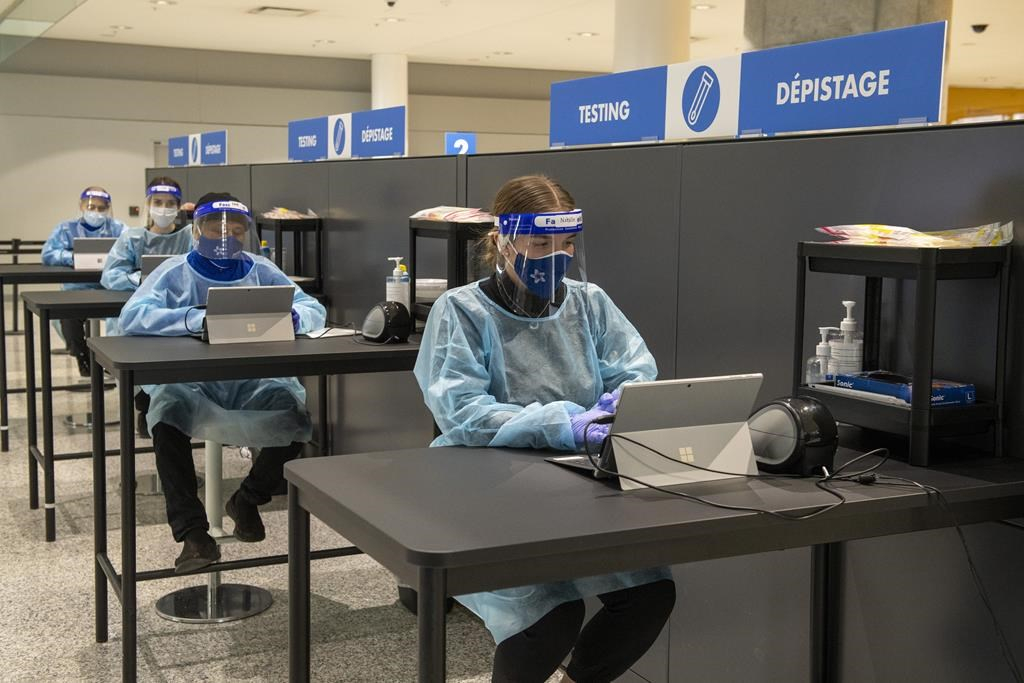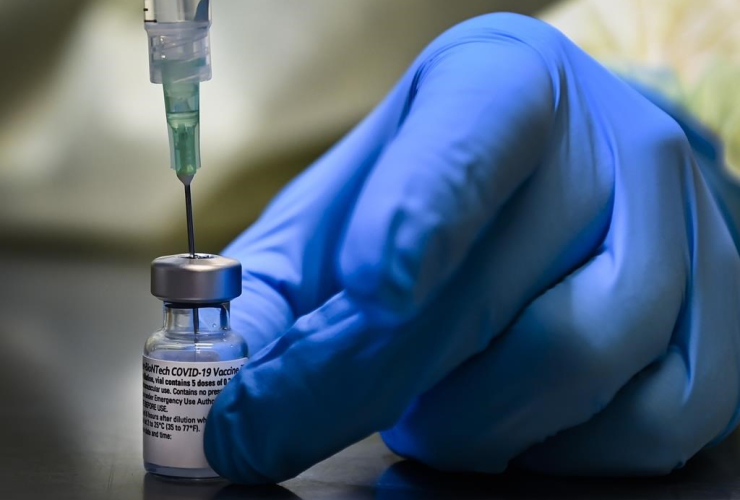A top science adviser says Ontario is far from in the clear despite a downward trend in COVID-19 cases, while some provinces criticized Ottawa for lower-than-expected vaccine shipments and the pandemic was flagged as an outsized contributor to Quebec's death count last year.
Canada's most populous province reported 2,093 new infections Thursday and 56 more deaths linked to the novel coronavirus. Cases have fallen since Ontario issued a stay-at-home order two weeks ago.
Dr. Adalsteinn Brown, who co-chairs Ontario's COVID-19 Science Advisory Table, said new infections are on track to decrease to between 1,000 and 2,000 a day by the end of February. There were several days earlier this month when they topped 3,000.
A new COVID-19 variant first detected in the United Kingdom, which is at least 30 per cent more transmissible, is circulating in the community. Brown said it would likely be the dominant version of the virus in March and risks pushing up Ontario's case count if not controlled.
"The new variants, like the variant from the United Kingdom, give us less room to relax and less room for error."
With the right amount of diligence, schools should be able to stay open, Brown said.
He added controlling the spread in workplaces like food plants and warehouses is critical.
"Just like a forest fire, if we don't pay attention to the hot spots, the whole forest will keep on erupting into flames."
Dr. Susy Hota, medical director of infection prevention and control at Toronto's University Health Network, said Ontario's data show that the restrictions have been effective in tamping down the spread of the virus.
"How long we need to maintain it is the big question," she said.
"This does take its toll on people. It's important to keep in mind what the impact is on the population, because you don't want to be trading off one health risk for another."
Hota added that anyone panicking about the new variants can take heart in knowing measures such as limiting contacts and masking seem to work against them.
"All is not lost. I think we still need to keep our focus on what needs to be done because it's still effective."
In Ottawa, Maj.-Gen Dany Fortin, who is in charge of Canada's inoculation effort, said supplies of the Pfizer-BioNTech vaccine are expected to be crimped in the weeks ahead as work to expand a plant in Belgium continues.
Fortin said Canada is to receive 149,000 over the next two weeks — one-fifth of what had previously been promised.
Pfizer is to send 335,000 doses the week of Feb. 15, which is 91 per cent of the previous delivery schedule.
"This is a bump in the road — not insignificant," Fortin told a media briefing. "But we have to look at the long game."
Fortin said Canada is expecting 20 million doses of both the Pfizer-BioNTech and Moderna vaccines between April and June, and more if additional vaccines receive Health Canada approval.
Provincial governments decried the latest vaccine projections.
Alberta Health Minister Tyler Shandro said his government was told Thursday that the province would receive 63,000 fewer vaccines than expected in the first quarter of the year.
“The federal government is failing Canadians. This is a grim situation that seems to be getting worse every week."
Saskatchewan Premier Scott Moe said on Twitter that Ottawa had lowered its estimates for total Pfizer vaccines in-hand by the end of March to 3.5 million from four million.
"We can’t vaccinate people when we aren’t getting vaccines and when we aren’t getting accurate information from the federal government."
Fortin said the government had given the provinces more conservative figures for planning purposes and has been assured by Pfizer that four million doses are on the way by the end of March.
Meanwhile, Quebec's statistics agency reported that deaths in the province rose 10 per cent last year because of the pandemic — a jump it considers to be exceptional.
The Institut de la statistique du Quebec said the number of deaths had risen by about two per cent per year between 2010 and 2019 due to a growing and aging population.
Quebec reported 1,368 new cases of COVID-19 on Thursday, as well as 39 additional deaths.
British Columbia reported 546 new cases and 12 more deaths on Thursday.
Provincial health officer Dr. Bonnie Henry has said the infection trend downward isn't enough to prevent COVID-19 spread and there have been outbreak "hot spots" in the province.
The Vancouver Coastal Health authority said there had been 288 infections in the ski resort community of Whistler since Jan. 1 and it urged out of town residents to use their own ski hills.
This report by The Canadian Press was first published Jan. 28, 2021.





Comments